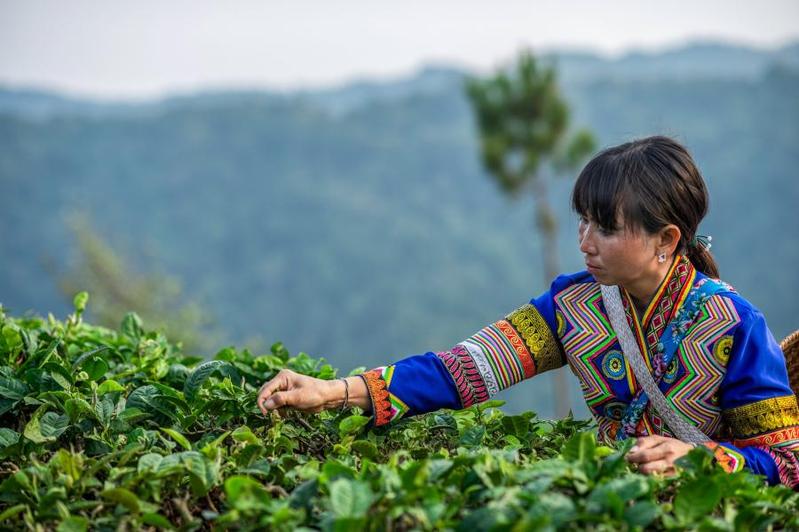



Known for cloud-shrouded snow mountains, pristine plateau lakes, lush rainforests and diverse ethnic cultures, Yunnan, a province in the remote southwest of China, has been deemed one of the trendiest tourist destinations in the country.
Beautiful as Yunnan's mountainous terrain is in the eyes of tourists, it has nevertheless barred some local residents from the world outside for generations and mired them in abject poverty until today.

A woman of Lahu ethnic group picks tea leaves at Bulangshan township in Menghai county, southwest China's Yunnan province, April 11, 2020. [Photo/Xinhua]
By 2019, the poverty-stricken population in Yunnan was about 442,000, making the province one of the main battlefields of China's nationwide poverty alleviation efforts, as the country races against time to eradicate absolute poverty by the end of this year.
New home, new jobs
Hua Liumei has never watched a baseball game, but she is now an expert of making baseballs.
The 29-year-old is a quality inspector at a baseball workshop in a resettlement site in Tuoping village, Nujiang Lisu autonomous prefecture. The prefecture has some of Yunnan's most inhospitable areas, with many villages perched on cliffs at elevations of over 2,000 meters. For these villagers, the only path out of poverty is relocating to places with better living conditions.
Hua started her job in the workshop last year after her family moved from their old log cabin in the mountains to a new apartment in the resettlement site. Before that, Hua, like many of her peers, had worked in big cities in eastern China to support her family.
"It's better to work near home because I can take care of my family while making money," she said.
"My family and our pigs and cattle crowded our small two-story cabin. With the livestock staying on the first floor, it stank so much in the summer," she recalled. "And we could barely feed ourselves by growing corn and potatoes."
Besides, attending school meant a four-hour walk on rugged mountain roads and a spine-chilling zip line crossing over the raging Nujiang River.
"With such bad conditions, there would be no future for me and my village," Hua said. Thus, when the local government launched the poverty-relief relocation program last year, she did not hesitate to move her family to their current residence.
Their new apartment has a flush toilet, an electric water heater and a variety of furnishings. Hospitals and kindergartens are also in place.
Relocation projects are an important approach to poverty-reduction. Across Yunnan, nearly 1 million poverty-stricken people have relocated to more habitable areas over the past few years, gaining access to better job opportunities and public services.
In the resettlement sites, poverty-alleviation workshops have been established and industries have been developed according to local conditions, ensuring a steady source of income for the relocated residents.
Sci-tech supports poverty reduction
To consolidate the province's poverty alleviation achievements, technology has been playing a key role in the development of local industries.
In Laowo township, an orange orchard covering over more than 20 hectares and equipped with an intelligent drip irrigation system was built last year. The orchard is managed by an orange-planting cooperative co-founded by 132 poor local households.
The drip irrigation system, controlled with a smartphone, can reduce human effort, save water and fertilizers and increase yields, said Li Jinxue, a researcher from the Yunnan Academy of Agricultural Sciences, who also works as Laowo's deputy Party secretary to help with the township's poverty alleviation efforts.
Liu Heping, a local farmer, said he earns a monthly salary of 2,600 yuan (about US$373) as vice president of the cooperative and he has transferred his land to the cooperative for an annual rent of 9,000 yuan.
"The orange orchard will become a ready source of money for us when the trees begin to yield later this year," he said.
In southern Yunnan's Lancang Lahu autonomous county, a poverty-stricken county on the China-Myanmar border, growing winter potatoes has become a local pillar industry over the past five years.
In 2015, the Chinese Academy of Engineering paired up with Lancang to cooperate in fighting poverty and started to dispatch researchers to the county to lay out plans for developing local industries.
The researchers suggested planting potatoes in winter and began training local farmers to help them grow the crop in a scientific way.
Liu Zhapi, a local farmer, said before the researchers came, all he had known about farming potatoes was sowing seeds and waiting for the yield. "The researchers taught us about the different varieties of potatoes and ways of removing viruses from the seeds and maintaining the fields," he said.
Thanks to the newly acquired knowledge, Liu Zhapi has harvested potatoes weighing up to more than 1 kg each. "The potato I grew was only as big as an egg in the past."
In the first half of 2019, he earned over 20,000 yuan from selling potatoes.
Zhu Youyong, an academician with the Chinese Academy of Engineering, said he is more than glad to see his research results take root in Lancang's farmlands and contribute to the county's poverty relief efforts.
"It's even better than receiving awards or seeing papers published," Zhu said.
